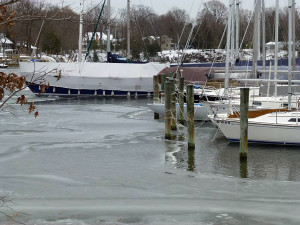
HAPPY THANKSGIVING
So you have stalled and delayed, and actually gotten a few fall days out of the season. But with Friday off, now you are facing your big decision.
Pull the boat out or winterize in the water?
Okay boys and girls, the northeast generally isn’t to kind to boaters who decide to keep their boats in the water all winter. Yet, many of you say that with de-icer, you can survive. It can help, but only in some instances. I don’t recommend keeping it in the water, but if you do:
Here are three winter disasters a de-icer can help prevent:
- Hull Damage
Normal current and wind speeds naturally make water rigs tip, rock and pitch in the water. When freezing temperatures and a layer of ice are added to the equation, the result is a nasty grinding action that can scratch and tear away the gel-coat along the waterline of fiberglass boats. This allows water to sneak into the laminate and further damage the hull. Ice can also get into the plank seams or the bilge of a wooden boat and cause anything from minor cosmetic damage to major leaks.
- Dock Lifting
Ice, wind and current are no friend to docks, either, especially if all three elements are thrown together. Because ice expands during the freezing process, the water levels will fluctuate, making it difficult for dock piles to stay firmly in place. Heavy ice flows and ice pressure can shift the dock pilings – or worse, pull them out of their footings entirely. Any watercraft near the dock could be damaged as the dock shifts.
- Ice Expansion
Like most substances, water at ordinary temperatures contracts, increasing in density as it cools. At about 4 degrees Celsius, however, water reaches its maximum density and then decreases in density as it reaches its freezing point. Because of this, ice forms on the top of the water first, allowing it to freeze and float, and then the rest of the ice forms below. This simple sequence can be disastrous for both docks and boat hulls. The pressure from ice expansion can crush a hull or dock, causing major damage and compromising the structural integrity of the craft.
Old Man Winter can try as he may to freeze lakes and rivers, penetrate boat hulls and crush docks – but he’ll have a much harder time succeeding if a de-icer is on hand to protect your goods during the winter.